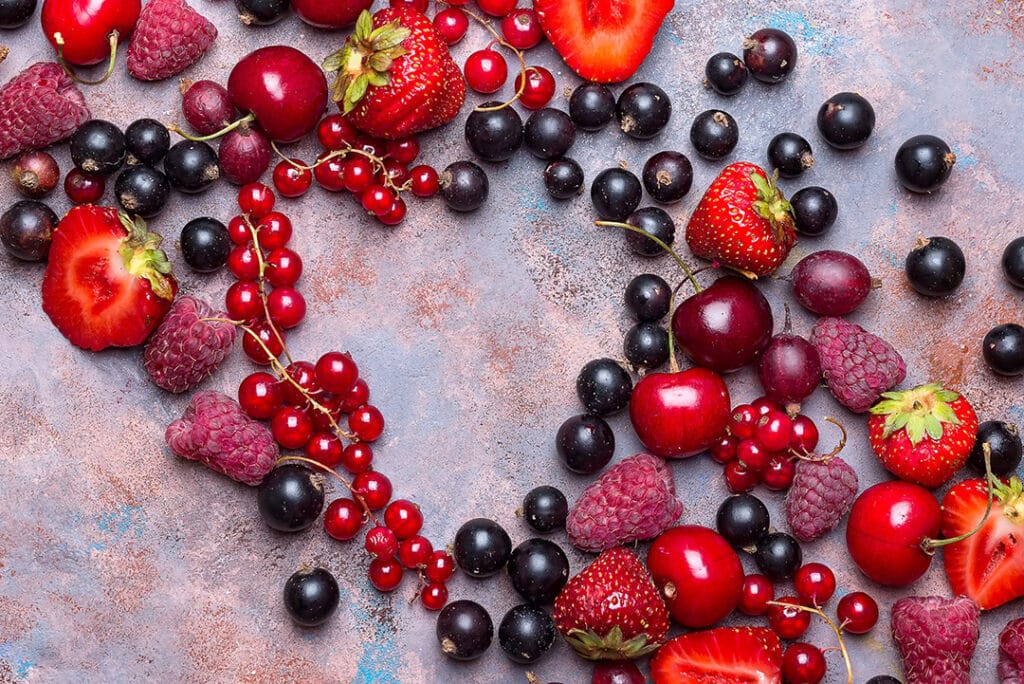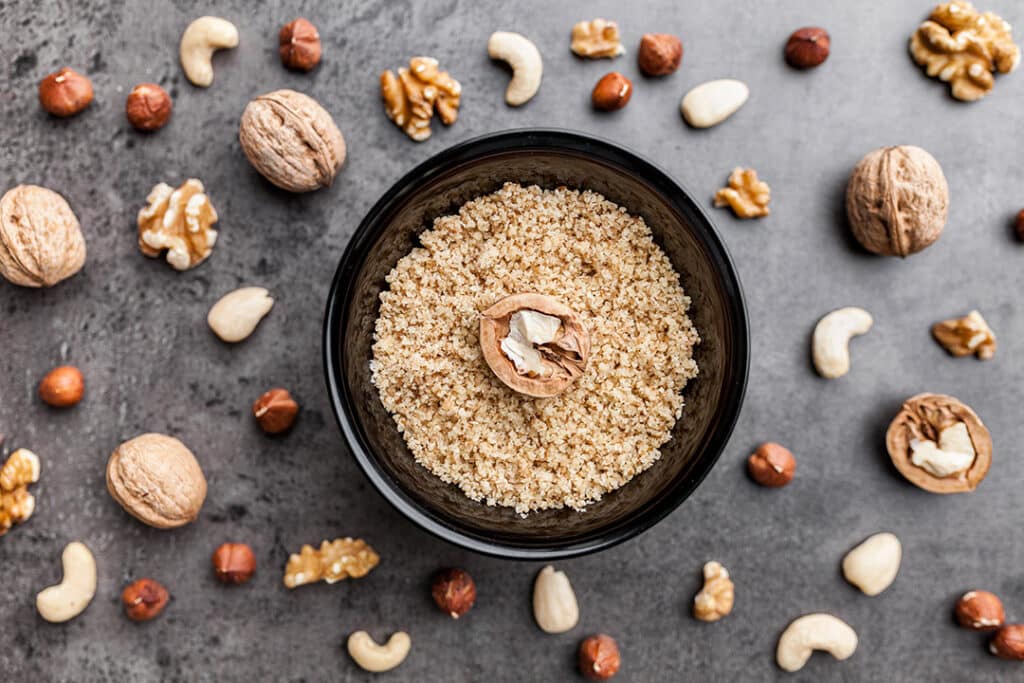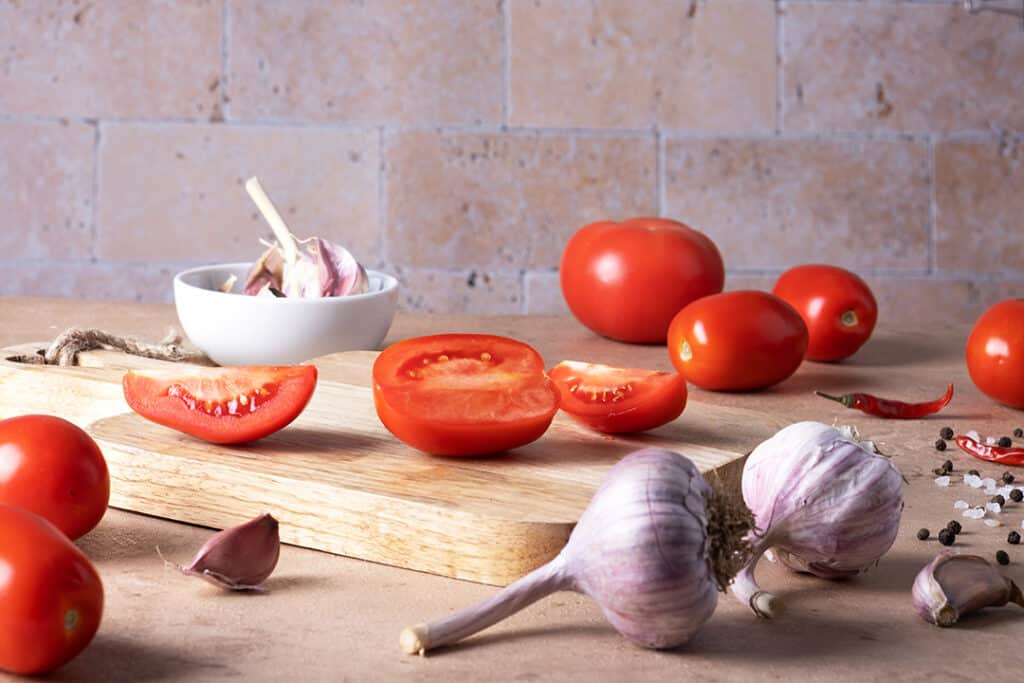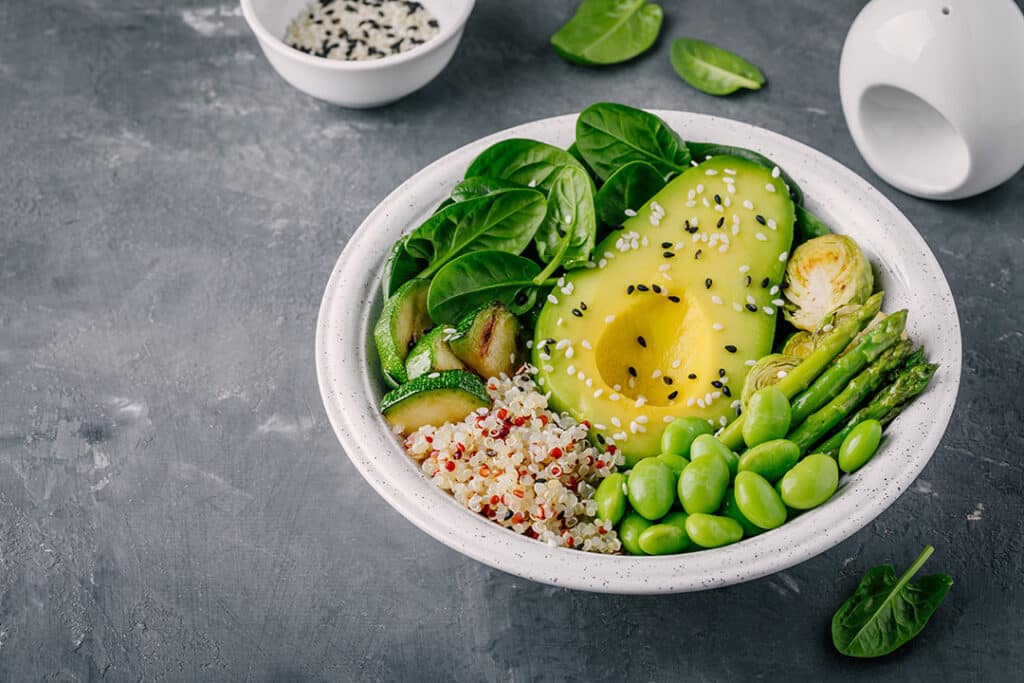Grab these 25 heart-healthy foods on your next trip to the grocery store to help protect your heart, lower cholesterol, improve blood pressure, boost circulation, and more.
Protecting yourself against America’s number one killer – heart disease – can seem like a huge undertaking. But what if your next bite could help protect your heart for years to come?
It’s true! Every meal is an opportunity to nourish your heart, boost your circulation, and support healthy blood pressure and cholesterol levels. By making the right choices at the dinner table, you can significantly reduce your risk of heart disease and feel more energized and balanced along the way.
Ready to show your heart some love? Start by adding more heart-healthy foods to your plate. Keep reading to explore our top 25 picks and get inspired for your next meal.
Want to learn more about how chiropractic care can help your heart health?
Schedule a visit with your local AlignLife chiropractor to discover how improving spine health and reducing nerve interference can support your overall well-being.
Why Your Heart Deserves a Healthy Diet

Your heart works tirelessly, beating around 100,000 times each day to deliver oxygen and nutrients throughout your body. The quality of what you eat can either lighten its load or make this job harder.
Poor dietary habits (like too many sugary treats, refined carbohydrates, and unhealthy fats) can increase “bad” LDL cholesterol, raise blood pressure, and spark inflammation. On the other hand, heart-healthy nutrients give your cardiovascular system what it needs to run smoothly and efficiently.
It’s kind of like choosing the grade of fuel you put in your car. Low-quality fuel is cheaper, but ultimately means reduced performance and more repairs down the line. Better fuel leads to better performance, a longer life for your engine, and fewer visits to the mechanic.
So, what foods fall into the dietary guidelines of “high-grade fuel” for your heart?
Omega-3s
Omega-3s are the gold standard of healthy fats. Found in fatty fish, chia seeds, and walnuts, omega-3s lower your triglyceride levels, improve arterial function, and reduce inflammation – all of which helps protect against heart disease.
Other Healthy Fats (Monounsaturated and Polyunsaturated)
Avocados, olive oil, and nuts contain these beneficial fats, which help improve cholesterol profiles by lowering LDL while maintaining or boosting “good” HDL levels, supporting overall heart health.
Fiber
High-fiber foods like oats, beans, and apples help reduce LDL (“bad”) cholesterol levels, steady blood sugar, and keep you feeling full and satisfied, so you’re less tempted by unhealthy snacks.
Antioxidants
Berries, leafy greens, and green tea are rich in antioxidants. These compounds combat oxidative stress and inflammation which can take a toll on any body system. When it comes to the heart, that means helping keep arteries clear and flexible and reducing your overall risk of cardiovascular issues.
Potassium
Potassium is a mineral abundant in foods like bananas, sweet potatoes, and leafy greens. Its main role? Regulating blood pressure by balancing sodium levels. Adequate potassium intake is like a gentle brake system that prevents your blood pressure from skyrocketing.
Debunking Myths About Heart-Healthy Foods
Before we dive into the best heart-healthy foods to enjoy, it’s important to get clear on what actually makes a food good for you. Here are some of the common myths we often hear about heart healthy foods – let’s debunk them.
Myth #1: “Heart-healthy eating is too expensive.”
Truth: You don’t have to shop at specialty stores or buy pricey superfoods to nourish your heart. Simple, budget-friendly options like dried beans, frozen vegetables, oats, and canned fish offer big benefits at a low cost. By planning your meals, buying in bulk, and opting for seasonal produce, you can enjoy balanced, heart-supportive meals without breaking the bank.
Myth #2: “All fats are bad.”
Truth: There was a time when fats were considered bad for health. But, the science has advanced, and the new dietary guidelines confirm, that not all fats are created equal.
While saturated and trans fats can harm your heart over time, healthy fats found in avocados, nuts, seeds, olive oil, and fatty fish actually help lower heart disease risk. These “good fats” improve cholesterol profiles and support overall cardiovascular health. Instead of cutting out fats entirely, focus on swapping in these better options.
Myth #3: “Heart-healthy eating means giving up all your favorite foods.”
Truth: It’s more about balance and smart choices than total sacrifice. You can still enjoy your favorite treats – just be mindful of portion sizes and try healthier preparation methods. Love pasta? Opt for whole-grain noodles and toss in veggies and lean protein. Craving dessert? Choose a small square of dark chocolate instead of a candy bar. With moderation and a few easy swaps, you can savor the flavors you love while still helping your heart.
25 Heart-Healthy Foods to Add to Your Plate
Wouldn’t it be great if there was a single food or supplement you could take to safeguard your heart? While there’s no single “magic bullet” food, adding a variety of heart-friendly options to your daily routine can add up to big benefits (and keeps your plate interesting).
From antioxidant-rich berries to fiber-packed whole grains, the following nutrient-dense foods work together to support healthy cholesterol levels, stable blood pressure, improved circulation, and reduced inflammation. Feel free to mix and match, try new recipes, and discover new flavors that do your body good.
1) Berries

Berries are tiny yet powerful. Their vibrant colors come from antioxidants called anthocyanins, which help reduce inflammation and improve artery function. Try them blended into smoothies or sprinkled on yogurt or salads. Great berries to grab for a quick snack include blueberries, strawberries, raspberries, and blackberries.
2) Salmon and Other Fatty Fish
Fatty fish are loaded with omega-3 fatty acids, which we learned were great for lowering triglycerides and supporting heart health. Regular servings of fatty fish can help stabilize your heartbeat and prevent arterial plaque buildup (while also supporting your brain). Plus, their lean protein helps keep you full and satisfied. Some good examples of fatty fish include: mackerel, sardines, and tuna.
3) Avocado
Avocados contain monounsaturated fats that help raise HDL (“good”) cholesterol and lower LDL (“bad”) cholesterol. They’re also rich in potassium, which supports healthy blood pressure. Did you know you can use avocados as a plant-based way to add healthy creaminess to salad dressings and desserts?
4) Leafy Greens
Leafy greens are nutrient-dense superstars packed with vitamins, minerals, and antioxidants. It’s no surprise they consistently come up as must-eat ingredients to support your health! Greens are particularly high in nitrates which helps lower blood pressure and keep your arteries flexible and healthy. Top healthy greens to grab include spinach, kale, Swiss chard, and arugula.
5) Oats

Oats are a great source of soluble fiber called beta-glucan, which works to reduce LDL cholesterol. Swap sugary cereals for a warm bowl of oatmeal, or make your own healthy granola to snack on throughout the day.
6) Walnut & Almonds
While most nuts pack a nutritional punch, walnuts and almonds are particularly helpful for equipping your body with healthy fats, plant-based omega-3s, magnesium, and fiber. A small handful makes the perfect snack to support heart health – just watch the portion size to keep calories in check.
7) Beans & Legumes
Full of plant-based protein, fiber, and folate, beans and other legumes help manage blood pressure and cholesterol. Stir them into soups, blend them into dips, or toss them into salads for a heart-healthy boost. Great sources of beans and legumes include black beans, kidney beans, chickpeas, and lentils
8) Olive Oil
The Mediterranean diet is often touted as one of the best diets for heart health. At its core? Extra-virgin olive oil. This healthy oil is high in monounsaturated fats and antioxidants that lower inflammation and support healthy cholesterol levels. Use it in dressings, drizzle it over roasted veggies, or dip a piece of whole-grain bread into it for a heart-friendly starter or snack.
9) Dark Chocolate
Good news, chocolate can be part of a heart-healthy diet – just be sure to choose dark chocolate and that is contains 70% cocoa or higher. Its flavonoids improve blood flow, curb inflammation, and can help reduce blood pressure. Enjoy a square or two for a guilt-free indulgence.
10) Tomatoes

Tomatoes are rich in lycopene, a powerful antioxidant linked to lower levels of LDL cholesterol. Their potassium content also helps regulate blood pressure.
11) Garlic
Garlic contains allicin, a compound that can help lower blood pressure and improve cholesterol levels. Crush or chop garlic to release its healthful properties and use it to infuse flavor into countless dishes.
12) Citrus Fruits
Citrus fruits are bursting with vitamin C and flavonoids that enhance blood flow and support cholesterol balance. Studies show that eating citrus fruits regularly is associated with lower levels of cardiovascular disease. Plus, their bright flavors also help you cut back on sugary treats (which can lead to inflammation and heart issues).
13) Chia Seeds and Flaxseeds
Tiny but mighty, these seeds deliver plant-based omega-3s and fiber to support healthy arteries and steady blood sugar levels. They’re also really versatile; simply stir them into oatmeal, smoothies, or add them to whole grain baked goods.
14) Sweet Potatoes
Loaded with fiber and potassium, sweet potatoes help regulate blood pressure while delivering a sweet, comforting flavor. They’re a wonderful swap for regular spuds when you crave something starchy.
15) Green Tea

While coffee can support heart health in moderation, green tea takes the win. Green tea is packed with catechins—antioxidants that improve blood flow and reduce the risk of heart disease. Sip a warm cup in the morning to start your day on a heart-friendly note.
16) Broccoli
This cruciferous veggie is high in fiber, potassium, and antioxidants. Broccoli helps maintain stable cholesterol levels and supports the body’s detox processes. Not a broccoli fan? Skip steaming or boiling and try it roasted with garlic or blended into soups.
17) Red Grapes
Red grapes contain resveratrol, an antioxidant found in grape skins that’s linked to lower inflammation and better circulation. Grapes are delicious on their own, or try roasting them with rosemary and root vegetables for a twist on your dinner side dish.
18) Pomegranates
Pomegranates (or pomegranate juice) is rich in both polyphenols and nitrates. These compounds promote healthy blood flow and work to lower blood pressure. Sprinkle pomegranate seeds over salads, yogurt, or oatmeal for a burst of tart flavor.
19) Low-Fat Yogurt and Dairy
By choosing low-fat dairy, you get calcium and potassium without excess saturated fat. This combo helps regulate blood pressure and keeps your heart’s rhythm steady. Just be sure to check the sugar content – some low-fat versions increase the sugar content to make up for the lower levels of fat. 0% Greek yogurt is often a safe choice.
20) Quinoa

If you’re looking to bulk up your meals in a way that’s good for your gut, brain, muscles, and heart, quinoa is a go-to. This whole grain that’s naturally gluten-free and rich in protein, fiber, and nutrients that support heart health. Use it as a base for salads, a swap for pasta or rice in soup, or as a high-protein side dish.
21) Edamame
Edamame are young soybeans with several health benefits. Much of this is due to their isoflavones, which help lower cholesterol and improve overall heart health. Enjoy edamame boiled with a pinch of sea salt, or add the shelled beans to salads, stir frys, smoothies, or even use it to make plant-based taco meat.
22) Beets
In general, fresh foods that are deep red or purple in color helps support the heart. And beets are no exception! Beets are particularly rich in nitrates that help your blood vessels relax which lowers blood pressure and improves circulation. Roast them, juice them, slice them thin for salads, or combine with heart-healthy dark chocolate to make beet brownies.
23) Bananas
Bananas are well-known for having high potassium. But what does that mean for your heart? Potassium helps balance sodium levels which maintains healthy blood pressure and supports your heart.
24) Apples
Apples don’t just make great on-the-go snacks. They’re high in fiber and antioxidants, help reduce LDL cholesterol and inflammation, two big risk factors for heart disease.
25) Barley
Barley is a delicious and satisfying whole grain, but it often gets overlooked. Try adding it to your soups and stews for an added source of beta-glucan fiber, which lowers cholesterol levels and supports overall heart health.
Smart Cooking and Eating Tips for Heart Health

Changing your eating habits can feel like a big leap, but it’s really about making a series of small, manageable shifts over time. That’s why focusing on incorporating more heart-healthy foods into your daily routine is one of the best ways to get started. By starting slowly, exploring new flavors, and building balanced meals, you can create sustainable habits that support your cardiovascular health (without totally giving up the foods you love).
Rethink your cooking methods
Instead of frying your meals in oil or butter, try other methods that still create flavor but retain nutrients. Baking, grilling, steaming, or roasting your vegetables, fish, and lean proteins helps keep saturated fats low and the good nutrients intact.
Go easy on the salt
Salt is often the first go-to for flavor, but too much sodium can raise blood pressure and stress your heart. Thankfully, salt isn’t the only way to pack your meals with flavor. Fresh herbs like rosemary or basil, warming spices like turmeric or cinnamon, and bright hits of citrus zest or vinegar can easily replace the salt shaker (and make your meals much more interesting).
Meal prep for success
When your week gets busy, planning ahead can be a lifesaver – and a heartsaver, too. Set aside a couple of hours on the weekend to meal prep a large batch of fiber-packed whole grains (like quinoa or barley), roast seasonal vegetables, or simmer a big pot of bean soup. Then, simply mix-and-match to create your weekly meals.
Eat Your Way to Better Heart Health

Adding heart-healthy foods to your plate is simple, but it’s so much more than just a quick fix. Research consistently shows that people who regularly eat the foods on this list reduce their risk of cardiovascular disease and enjoy better health.
But living a heart-healthy lifestyle goes beyond choosing general good-for-you foods. Need a little extra guidance? Schedule a visit with your local AlignLife chiropractor to learn more about creating heart-healthy habits, including meal plans, exercise regimens, supplements, and more. Our team can help you craft a personalized plan that fits your lifestyle and supports your heart.



